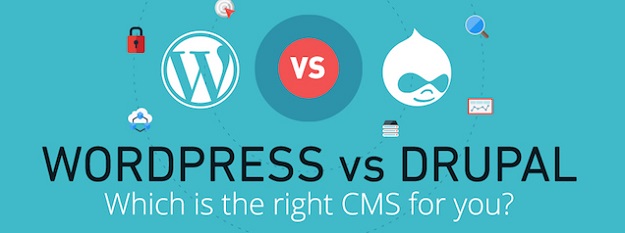When you talk Content Management System platforms, WordPress and Drupal are two names that never miss. And for the business owner, the right CMS platform is one that meets their specific company’s short and long-term goals.

If you’re simply in search of an open-source and easy-to-use solution to content management, then both platforms will do. But if you inquire more, you’ll have a range of opinions on which platform is the most excellent based on who you ask. For instance, a tech-savvy web developer will have a different view from a micro-business owner. This disparity comes from the fact that they have different technological skills, and are looking to achieve different goals.
Here’s a hosting review to guide you on the different CMS platforms:
General Statistics
Though Drupal is way older than WordPress, it only powers 2% of sites globally compared to WordPress’s 30%. And with such a notable difference in popularity, one may wonder why we compare these two platforms. Despite one being more popular than the other, both Drupal and WordPress deserve recognition when it comes to CMS solutions.
How the CMS solutions Differ
Let’s take a look at the primary differences between WordPress and Drupal;

Price
Pricing means the total cost of establishing and redesigning site using one of the two platforms which makes it quite unpredictable. This is because the overall amount you pay comes down to what you want the platform to do for you.
Security
From an expert’s perspective, both platforms are designed to offer top-notch security. However, WordPress may seem inferior, but the problem is rooted in the plugins and not the CMS platform itself. These third-party plugins form the weak-points tricksters use to breach WordPress sites.
Customizability & Extensibility
It’s difficult judging which CMS platform is more extensible and customizable—in fact, most programmers would give both brands credit. However, each platform has achieved this in a special, and different way.
WordPress allows users up to 5,000+ charge-free themes & 53,000+ free plugins, whereas Drupal offers 2,500+ themes plus 39,000+ modules (same as what WordPress refers to as “plugins”). The fact that WordPress offers a wide range of themes and plugins for extra functionality makes it quite customizable by all user levels.
On the other hand, with Drupal, much of what you need to do to customize your platform is already built into the primary themes, so you don’t have to over-depend on third-party plugins. Plus, Drupal is the best platform for organizing huge amounts of data & content.
User-friendliness
WordPress is more user-friendly than Drupal. Perhaps that explains why it has gained more popularity than its older counterpart. One will easily understand what’s up in WordPress than they would with Drupal which is a bit complex. Moreover, WordPress is more intuitive and comprehensible for the non-programmer who wishes to build a site from scratch.
In comparison, you must break some sweat to get a website up and running when using Drupal. It makes work difficult for apprentice developers. Unlike WordPress, it is not a platform many users would find accessible. Rather, it requires that the user gets up to speed on operating the platform before diving into a development project.
